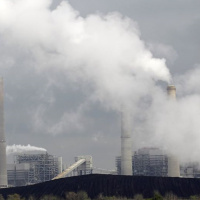Obama’s Aggressive Environmental Agenda Relies on Powerful 1970 Clean Air Act
 David J. Phillip--Associated Press
David J. Phillip--Associated Press
Those Republicans and businessmen complaining about President Barack Obama’s environmental plan can pin the blame on two noted left-wingers—Presidents Richard Nixon and George H.W. Bush—for Obama’s ability to put his ideas into force.
The Clean Air Act (pdf) was signed by Nixon in 1970 and gave the newly created Environmental Protection Agency (EPA) and states the power they needed to clean up the atmosphere. Bush followed in 1990 by strengthening the Act to allow more regulations to be issued. Now, since Congress has been unable to pass a bill to combat global warming, Obama is using the Clean Air Act’s provisions to attempt to mitigate climate change, according to The New York Times.
“It’s the granddaddy of public health and environmental legislation,” Paul Billings, a vice president of the American Lung Association, told the Times. “It empowers the EPA and states to be bold and creative.”
Obama is actively harnessing the power afforded him by the Act to launch what is, essentially, “America’s first national policy for combating global warming and a fundamental reshaping of major sectors of the economy, specifically auto manufacturing and electric utilities,” wrote the Times’ Coral Davenport.
Indeed, the Act has allowed Obama “to push forward in a way that no president ever has,” Jody Freeman, director of Harvard University’s Environmental Law Program, told the newspaper.
Already, regulations have been issued that will force new cars to average 54.5 miles per gallon by 2025. Next, the EPA will finalize limits on pollution by coal-fired power plants. And just this week, the Obama administration put out new rules to trim the amount of smog-causing ozone in the atmosphere.
“Ozone is not only killing people, but causing tens of millions of people to get sick every day,” William Becker, executive director of the National Association of Clean Air Agencies, told the Times.
Coal-country politicians, such as incoming Senate Majority Leader Mitch McConnell (R-Kentucky), and utility industry officials are predictably opposed to such regulations. Oddly, McConnell in 1990 voted for the expansion of the Clean Air Act. “I had to choose between cleaner air and the status quo,” McConnell said then. “I chose cleaner air.”
McConnell now appears to be choosing dirtier air. He has said he will attempt to block or overturn the rules and the Supreme Court announced Tuesday that it will hear a challenge to regulations intended to curb mercury emissions from coal plants.
“The current review of health studies has not identified compelling evidence for more stringent standards, and current standards are protective of public health,” Howard Feldman, director of regulatory affairs for oil-industry lobbyist American Petroleum Institute, told the Times.
Don’t feel too bad for the carbon industry though. Studies have shown that environmental foes almost always wildly overestimate the cost of regulations and their effects on the economy. A study by the Center for American Progress showed that the last time the ozone standard was tightened, in 1997, predicted economic problems didn’t occur. Instead, growth rates and employment levels in the areas affected by the standards closely matched those of the nation as a whole.
-Steve Straehley
To Learn More:
Obama Builds Environmental Legacy with 1970 Law (by Coral Davenport, New York Times)
Industry Groups Are Freaking Out about Obama’s New Smog Pollution Rule (by Emily Atkin, ThinkProgress)
Obama to Introduce Sweeping New Controls on Ozone Emissions (by Coral Davenport, New York Times)
As Obama Strikes Climate Accord with China, the Environment Lands in Crosshairs of New Republican Congress (by Noel Brinkerhoff and Steve Straehley, AllGov)
- Top Stories
- Unusual News
- Where is the Money Going?
- Controversies
- U.S. and the World
- Appointments and Resignations
- Latest News
- Trump Announces He Will Switch Support from Russia to Ukraine
- Americans are Unhappy with the Direction of the Country…What’s New?
- Can Biden Murder Trump and Get Away With it?
- Electoral Advice for the Democratic and Republican Parties
- U.S. Ambassador to Greece: Who is George Tsunis?






Comments